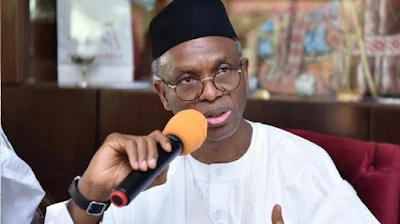El-Rufai Issues Grim Economic Outlook, Warns of Nigeria’s Possible Collapse in 2026
Former Kaduna State Governor Mallam Nasir El-Rufai has sounded a dire alarm, sharing a chilling economic forecast predicting Nigeria’s financial collapse by September 2026 unless immediate measures are taken. In a post on his verified X handle on Thursday, July 31, 2025, El-Rufai shared an article titled Nigeria 2026: The Year All Hell Breaks Loose, authored by Dr. Nnaoke Ufere, which uses machine learning models and economic simulations to project a 75% probability of a catastrophic debt crisis. The warning has sparked heated debate, with some hailing El-Rufai as a visionary and others dismissing the forecast as alarmist, amid Nigeria’s ongoing economic struggles.
The article, amplified by El-Rufai’s call for Nigerians to share it with National and State Assembly members, paints a grim picture: a potential default on external debt obligations, a crashing naira, and a banking system collapse. It predicts Nigeria’s sovereign credit rating could be downgraded to junk status, triggering creditor demands for immediate repayment and cutting off external funding. The Central Bank of Nigeria (CBN) might resort to excessive money printing, fueling hyperinflation, while shortages of food, fuel, and medicine could lead to crumbling public infrastructure and a breakdown in law enforcement, paving the way for widespread insecurity and unrest. “This is not speculation or alarmism,” the report states. “It is a clear and present danger based on rigorous analysis.”
El-Rufai, who defected to the Social Democratic Party (SDP) from the All Progressives Congress (APC) in March 2025, urged swift action to avert the crisis, positioning himself as a reformist voice. The SDP’s Kaduna chapter praised him as a “strategic thinker” whose warnings “unsettle those who fear real change,” noting his national influence and reformist vision. However, critics, including APC spokesperson Festus Keyamo, accused El-Rufai of hypocrisy, pointing to his role in the APC governments under former President Muhammadu Buhari, which oversaw two recessions and rising debt. A May 2025 article in The Republic called El-Rufai’s activism a “cloak of opportunism,” arguing he was complicit in Nigeria’s economic decline during his tenure as a Buhari ally.
Nigeria’s economy is already under strain, with inflation hitting 34.6% in November 2024, a 500% petrol price surge since 2023, and the naira depreciating 89.1% against the dollar from 2014 to 2024. The International Monetary Fund (IMF) projects modest growth of 3.4% in 2025 and 3.2% in 2026, but warns of structural issues like oil dependency, weak infrastructure, and insecurity hampering progress. A World Food Programme report forecasts 33.1 million Nigerians facing acute food insecurity in 2025, driven by inflation, climate change, and northeastern violence. El-Rufai’s forecast aligns with these concerns, amplifying fears of a deeper crisis.
Social media reactions on X were polarized. @NaijaGist tweeted, “El-Rufai’s 2026 collapse warning is scary, but is he just stirring the pot for political gain? #NigeriaEconomy,” while @EagleEyeNG wrote, “He saw this coming. Tinubu must listen to El-Rufai’s economic alert!” Others, like @TruthSeekerNG, questioned his credibility, posting, “El-Rufai backed Buhari’s mess for 8 years. Now he’s a prophet of doom?” The Senate, currently probing NNPCL’s alleged ₦210 trillion financial discrepancies, has yet to respond to El-Rufai’s call for legislative action.
The forecast has renewed focus on President Bola Tinubu’s reforms, including fuel subsidy removal and naira floatation, which have fueled inflation but are defended as long-term fixes. The World Bank suggests Nigeria’s economy could grow at 3.5% annually through 2026 with sustained reforms, but warns that deeper structural changes are needed to avoid stagnation. El-Rufai’s warning, while controversial, underscores the urgency of addressing Nigeria’s debt, which saw debt servicing rise from N8.25 trillion in 2024 to a projected N11.1 trillion in 2026.
